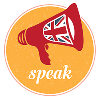Understanding the basic grammar rules is essential for communicating efficiently and today we answer the question 'How can I improve my English grammar? However, many of us have forgotten those concepts, so it is good to renew them once in a while. In the previous article How to learn English grammar, we clarified what grammar is and how you can get a better understanding of it.
Here are 5 tips that can help you improve your knowledge of English grammar:
1. KNOW THE PARTS OF SPEECH
2. LEARN THE DIFFERENCE BETWEEN CONFUSING WORDS
3. USE PUNCTUATION PROPERLY
4. UNDERSTAND THE ARTICLES
5. CONJUGATE VERBS PROPERLY
1. KNOW THE PARTS OF SPEECH
To put sentences together correctly, you must understand what parts of speech are and how they function in sentences. In the previous article, How to learn English grammar easily, we only mentioned them, today I'll go into more detail and give you some examples.
Here are 5 tips that can help you improve your knowledge of English grammar:
1. KNOW THE PARTS OF SPEECH
2. LEARN THE DIFFERENCE BETWEEN CONFUSING WORDS
3. USE PUNCTUATION PROPERLY
4. UNDERSTAND THE ARTICLES
5. CONJUGATE VERBS PROPERLY
1. KNOW THE PARTS OF SPEECH
To put sentences together correctly, you must understand what parts of speech are and how they function in sentences. In the previous article, How to learn English grammar easily, we only mentioned them, today I'll go into more detail and give you some examples.
- NOUNS: Nouns are the elements that usually perform the action in a sentence. Those elements can be a person (Peter), place (London), thing (table), idea (philosophy), emotion (angry), animal (cat), or event (graduation).
- ADJECTIVES: Adjectives modify nouns and describe aspects or characteristics of nouns. For example: blue, childish, active, small, and tall.
- PRONOUNS: Pronouns take the place of nouns. There are personal subject pronouns (such as I, she, and they), personal object pronouns (such as us, you, it, and them), personal possessive pronouns (such as mine, yours, his, hers, and theirs), and relative pronouns (such as who, which, that, and whose).
- VERBS: Verbs indicate actions or states of being and tell what the noun is doing. For example: walk, whistle, write, be, and run.
- ADVERBS : Adverbs modify verbs, adjectives, conjunctions, prepositions, and other adverbs. They are words like quickly, well, and slowly. These words often end in –ly.
- PROPOSITIONS: Prepositions indicate relationships in time, space, or direction. Prepositions include to, in, on, over, of, and across.
- CONJUNCTIONS: Conjunctions join nouns, clauses, phrases, and sentences. Coordinating conjunctions connect independent clauses (for, and, nor, but, or, yet, so). Subordinating conjunctions connect dependent clauses (because, if, since, while, and although).
- INTERJECTIONS: Interjections are words that indicate emotions. These include oh, hey, ouch, and wow. They are often followed by exclamation points.

2. LEARN THE DIFFERENCE BETWEEN CONFUSING WORDS
The second tip to improving your English grammar is to learn the difference between confusing words. English has a lot of words that look, sound, or are spelled the same, but they can have very different meanings. They can cause a great deal of confusion and result in frequent errors.
Remembering them will help you avoid frequently made mistakes. We can divide them into 4 different groups:
Lead, pronounced LED, means a metallic element.
Book – the act of making a reservation
The second tip to improving your English grammar is to learn the difference between confusing words. English has a lot of words that look, sound, or are spelled the same, but they can have very different meanings. They can cause a great deal of confusion and result in frequent errors.
Remembering them will help you avoid frequently made mistakes. We can divide them into 4 different groups:
- Homographs: Words that are spelled the same
- Homophones: words that are pronounced the same.
- Heteronyms: words that are spelled identically but pronounced differently.
Lead, pronounced LED, means a metallic element.
- Homonyms: Words that are spelled and pronounced the same.
Book – the act of making a reservation
Jake Borland
Jake Borland is an experienced English teacher with 20 years in the field. As the co-founder and Marketing Manager of Speak English Institute, he is dedicated to delivering high-quality education both in-person and online. Jake’s passion lies in helping students improve their English skills through engaging and effective learning experiences.

